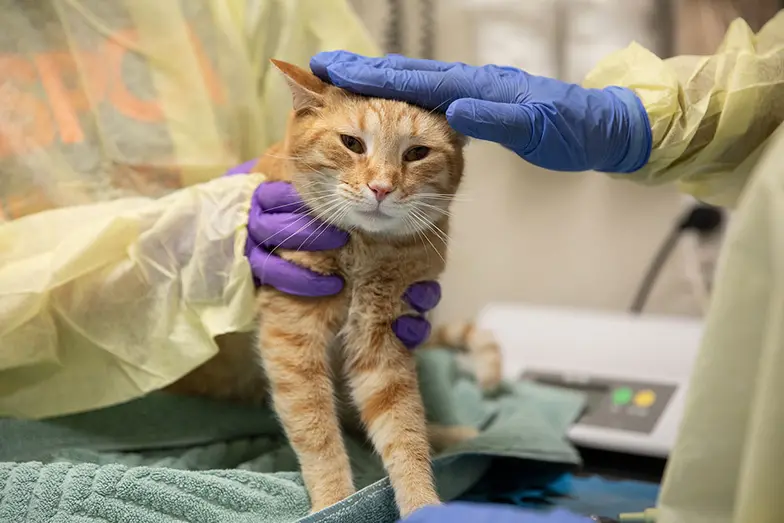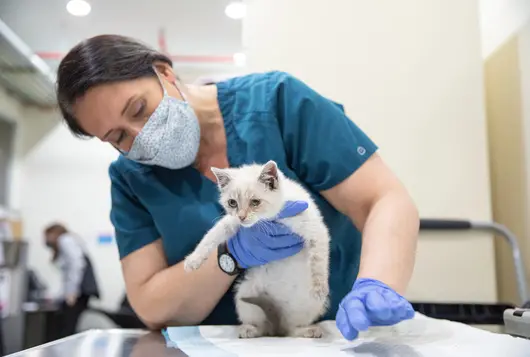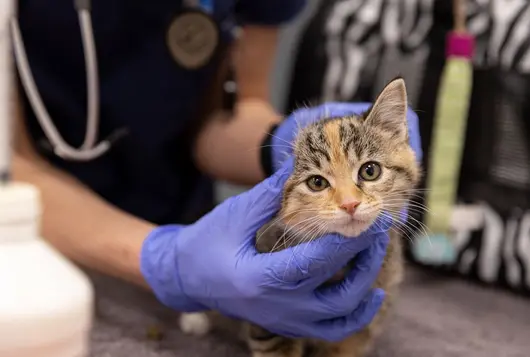Pyometra Surgery and Access to Veterinary Care

Pyometra is a common disease of sexually intact female dogs and cats. It occurs when hormonal changes in the animal’s body can lead to infection in the uterus. If left untreated, pyometra can result in sepsis (whole body infection), kidney failure, and death.
Ovariohysterectomy (OHE) with supportive care is the recommended treatment for pyometra, but many general practice veterinarians refer pyometra cases to emergency clinics due to the perception that patients may need more specialized care or the difficulty of scheduling an urgent surgical procedure.
Despite the excellent prognosis for this disease, many dog and cat owners are unable to afford the cost of emergency OHE for pyometra, which may lead to euthanasia or death from an untreated infection.
Additionally, low-income pet owners are often less likely to have pets who are spayed, so pyometra may be more common among pets with owners who struggle to access veterinary care because of finances or other barriers.
The ASPCA has conducted and supported research studies that suggest general veterinary practitioners are fully capable of performing pyometra surgeries and by doing so, increase access to care for people who would otherwise be faced with euthanizing their pet. The research, general takeaways, and links to the full studies are below.
Findings and Prognostic Indicators of Outcomes for Bitches with Pyometra
This research refuted the common belief that pyometra must be treated on an emergency basis, as many of the patients in the study had either been seen previously at other veterinary clinics or had a protracted duration of clinical signs. Data demonstrated that most bitches, even with apparently high-risk presentations of serious illness, survived to hospital discharge after OHE was performed in a general, non-specialty hospital with high-quality basic supportive care. Even without highly specialized treatments, such as plasma transfusions, dialysis, and Jackson-Pratt drains, bitches that underwent OHE for pyometra had a 97% (394/405) rate of survival to hospital discharge. As such, most general practitioners who offer OHE could expect to see similar outcomes.
Findings and Prognostic Indicators of Outcomes for Queens with Pyometra Treated Surgically in a Nonspecialized Hospital Setting
Research on pyometra in cats is limited, so the results of this study are particularly important as they add to the knowledge base of feline care. Research results suggested that OHE for pyometra may be slightly delayed for many queens without detrimental effects on outcomes. Half (63/126) of the queens who underwent OHE had been seen previously by another veterinarian because of pyometra signs prior to visiting the treating hospital, and a substantial portion (44/105 [42%]) had had clinical signs for more than 1 week. Despite this, none of these queens died, and only 41 of the 126 (33%) surgically treated queens required more than 2 nights of hospitalization. This suggests that clients who cannot afford immediate OHE in an emergent setting may be able to be scheduled for a more affordable surgery the following day.
Owner-Reported Long-Term Outcomes, Quality of Life, and Longevity After Hospital Discharge Following Surgical Treatment of Pyometra in Bitches and Queens
The results of the survey data coupled with medical record data suggested that the long-term outcomes of OHE for pyometra are very good. None of the patient deaths after hospital discharge were related to pyometra or OHE, and only 3 bitches and 2 queens had complications after hospital discharge that were related to pyometra or OHE. Most owners reported their pet’s quality of life was better or the same as before the pyometra infection and that they would likely do the surgery again. Even the older cats and dogs did very well, supporting the decision to do surgery in these patients without other serious diseases. Given that OHE for pyometra was highly effective and had excellent long-term outcomes for bitches and queens, including older ones, general practice veterinarians can feel comfortable offering this important procedure.
Surgery in a Veterinary Outpatient Community Medicine Setting Has a Good Outcome for Dogs with Pyometra
This study, conducted at a veterinary teaching center, found a high survival rate (97% [129/133]) among a population of dogs with surgically treated pyometra. This high survival rate was also seen in dogs who were operated on by less-experienced clinicians, were treated as outpatients, and potentially had treatment delays until surgery could be performed. There was no overall difference in survival rates between the type of treatment facility (referral hospital vs. community clinic), even though surgical experience and postoperative case management were very different between them. At the referral hospitals (compared with the community clinics), dogs waited less time between diagnosis and surgery, stayed in the hospital longer (up to 3 days), and underwent surgery performed by individuals with more advanced training in surgery.
Increased Access to Vet Care is the Main Takeaway
The main takeaway from all 4 studies is that pyometra can be safely treated by most general practice veterinarians, thereby increasing access to veterinary care.
We have lots more on this subject:

